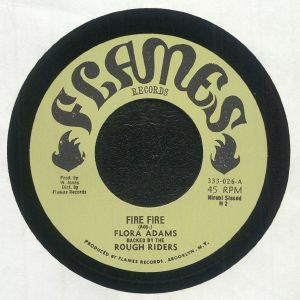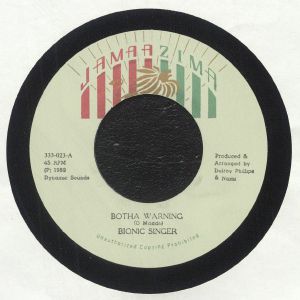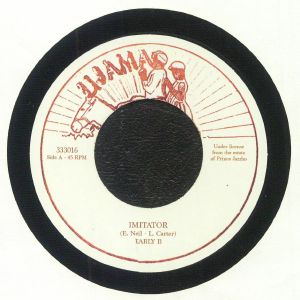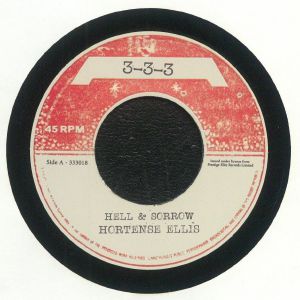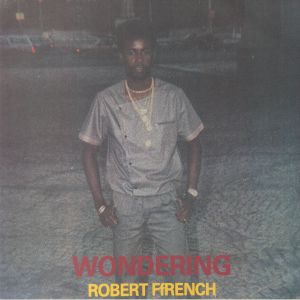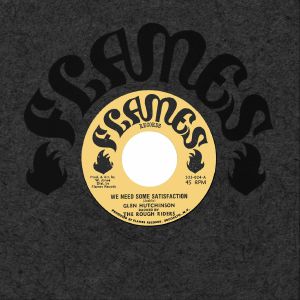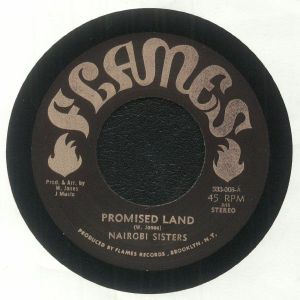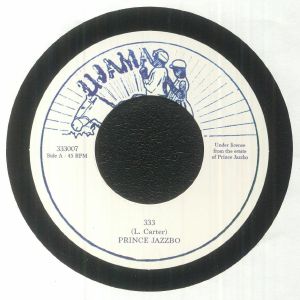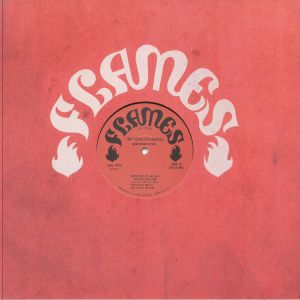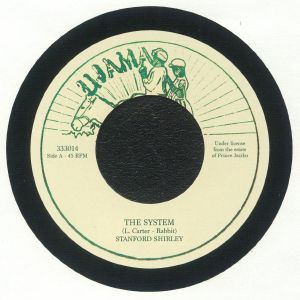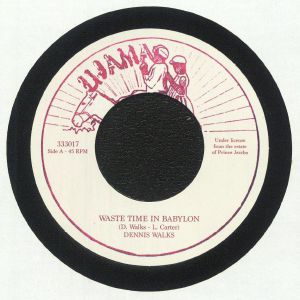Receive new release alerts for 333 UK
Filter
Type
Featured
リリースタイトル
値段
タグ
333 UK レコード& CD
Browse the latest Vinyl & CD releases on 333 UKSimilar labels:
1~13/13(ページ1/1)の商品
in stock $16.05
Review: 333 UK shed backscattered light on another late 1980s anti-apartheid reggae opus, Bionic Singer's 'Botha Warning'. Salvaged from the formerly seafloor dwelling chest that is the Jamaazima label back catalogue, 'Botha Warning' is a star riddim from the late great Osbert "Madoo" Maddo, who was brought up in East Kingston and as a child attended the legendary Alpha Boys School. Over his career he recorded mainly with Joe Gibbs and Errol Thompson, and for Winston Riley's famous Techniques label. The Bionic Singer alias came later, after a move to New York from Jamaica and brief hiatus; releasing on the Bronx-based Jamaazima, 'Warning To Botha' is a bloodthirsty send for South Africa's then prime minister P.W. Botha, set to a sturdy bubbler backing - the track indicts his policies as a key cause for the brutal segregation of the period.
… Read morePlayed by: Juno Recommends Dancehall/Ragga
in stock $17.71
Review: Death Is Not The End sublabel 333 Records reissue, in their estimation, one of the key 45s in the output of Prince Jazzbo's Ujama label, active in the late 1980s, and which preceded and perhaps presaged the oncoming digidub movement of the 90s. At this point, the artist known as Earlando Neil aka. Early B was a favourite fixture of Jazzbo's roster, famously channelling a proto-digital sound before the advent of digital dub production proper would unfortunately eclipse him. 'Imitator' is one such originator and version: a gruff, monophonic, bassy dancehall dragger, pon which B's vocal toasts are effortless to the point of burnt and hair-raising, and the basses sound like blowpipes; clock the synth bell too, also heralding the digital revolution to come.
… Read more in stock $18.27
Cat: 333 018. Rel: 22 Aug 24
Roots/Lovers Rock
Review: Death Is Not The End's 333 series reissues the exceptional original cut of the late Hortense Ellis' wonderful 'Hell & Sorrow' here. It was originally produced by Jimmy Radway and released on his Fe Me Time label in the mid-1970s and remains a popular joint on the sound system circuit. Here this most classic track is paired with the iconic DJ counteraction 'Tribulation' by Big Youth, which offers a compelling glimpse into reggae's rich history while also laying down a nice fat rhythm.
… Read morePlayed by: Piers Harrison, Juno Recommends Reggae
in stock $8.31
Review: Active since the early 1980s, Robert Ffrench is a curio in the reggae scene, with a penchant for extra drum machines and a distinctly wacky sound. Emblematic of Ffrench's approach to music-making is the album 'Wondering', which here comes reissued via 333. Entirely themed around the tumult of Ffrench's relationships while living in 1980s Jamaica, hilarities like 'I Can't Finance You' and 'Heart Breaker' reflect the artist's intense thoughts on the various women in his life. It's all helped along, best of all, by his remarkable synthwork, making this an essential listen.
… Read more in stock $26.30
Review: Death Is Not The End's wonderful 333 series continues here with another standout digi roots 7? from late 90s New York star Gumbae Culture, who it is said was a favourite of Jah Shaka. 'Take It Easy' was produced by Ricky "Mad Man" Myrie, a key figure in reggae/dancehall production since the early 90s and someone now just as known for working with Sean Paul and Capleton. Gumbae Culture's sharp vocals lead the way on a deep, dubby, cavernous track that was recorded at Philip Smart's iconic HC&F Studio with engineering by Michel McDonald. Haunting xylophone, sharp snares, and deep subs drive it onward and if you like it more stripped back then flip it over and dive into the version.
… Read more in stock $18.27
Cat: 333024. Rel: 20 Mar 25
Roots/Lovers Rock
Review: Originally released in 1979, this rare 45 from the American reggae artist now sees a well-deserved reissue, bringing classic roots and lovers rock reggae back to its intended format. On Side-A, 'We Need Some Satisfaction' delivers a dynamic horn section, a classy reggae groove and strong, soulful vocals that truly is killer. The track strikes a perfect balance between rhythm and melody, exuding the smooth vibe of late '70s reggae. On Side-B, 'Dub Music' takes us into deep dub territory, with a mostly instrumental arrangement, peppered with vocal snippets to keep the connection to the original track. The deep roller bass and atmospheric layers create a deeper listening experience for dub enthusiasts.
… Read more in stock $16.05
Review: Hugh Maddo's Pop Style is one of those super rare but cult late 80s reggae and dancehall albums that just hit a perfect sweet spot between styles. Thankfully, Death Is Not The End sub-label 333 has got the rights to this full reissue of the original which was recorded in Jamaica at Byron Lee's Dynamics and Herman Chin-Loy's Aquarius studios in 1987. A wealth of musical talents of the day all feature on it including Winston Wright, Bobby Ellis, and Mikey "Boo" Richards, but the standout is the sublime vocal contribution of Killamanjaro's Hugh Maddo.
… Read morePlayed by: Sol Power All-Stars, Juno Recommends Dancehall/Ragga
in stock $26.30
Review: A repro of the much in-demand Flames cut first made by the Nairobi Sisters in 1974, 'Promised Land'. Infamously sampled by Q-Tip for 'Whateva Will Be' as well as on a range of earlier 90s boom-bap era productions, it is not at all hard to figure out why it's a coveted record. The Nairobi Sisters were singers Terrie Nairobi and Judy Mowatt, and 'Promised Land' was first recorded with the band The Gaytones, under license to the Gay Feet label. Later cut to Winston Jones' Flames Records, the track and its dub version came to define the Brooklyn reggae scene, owing to the enduring interest it commands today.
… Read morePlayed by: Charlie bucket/ dancing in space
in stock $18.27
Played by: Juno Recommends Dancehall/Ragga
in stock $19.11
Review: Mediation in Dub by The Revolutionaries, reissued as part of Death Is Not The End's 333 series, delves into the archives of NYC-based Flames label. The Revolutionaries, a renowned reggae session band, comprised a rotating lineup of top Jamaican musicians, anchored by the formidable duo of Sly Dunbar and Robbie Shakespeare. Recorded at Channel One studio in Kingston during the mid-1970s, under the guidance of producer Ossie Hibbert, these tracks feature dub versions of Winston Jones's Flames label releases. Jones, known for his work on 'Stop That Train,' established Flames in NYC in the early 1970s, becoming a key player in Brooklyn's reggae scene. Meditation in Dub is a collector's gem, offering essential dub versions of popular rhythms from the era. This reissue, licensed from Jones and mastered with assistance from DKR, provides a valuable snapshot of reggae's roots and early dancehall periods.
… Read morePlayed by: Juno Recommends Reggae, Juno Recommends Dub
in stock $24.64
in stock $14.39
Review: Foundational reggae artist Dennis Walks' 'Waste Time in Babylon' has long been a much sought-after track and it is now the latest 1980s digital gem to be reissued on 45 as part of the 333 series. The tune was originally produced by Prince Jazzbo for his Ujama label in 1987 and finds Walks, who first gained recognition in the early 1970s working with producers Harry Mudie and Joe Gibbs, delivering his trademark powerful vocals over the iconic 'Racecourse Rock' rhythm. The track also features legendary keyboardist Winston Wright in fine form which helps to make this reissue a must-have for fans of classic reggae and digital-era fusions.
… Read more in stock $15.23
1~13/13(ページ1/1)の商品

 USD
USD





